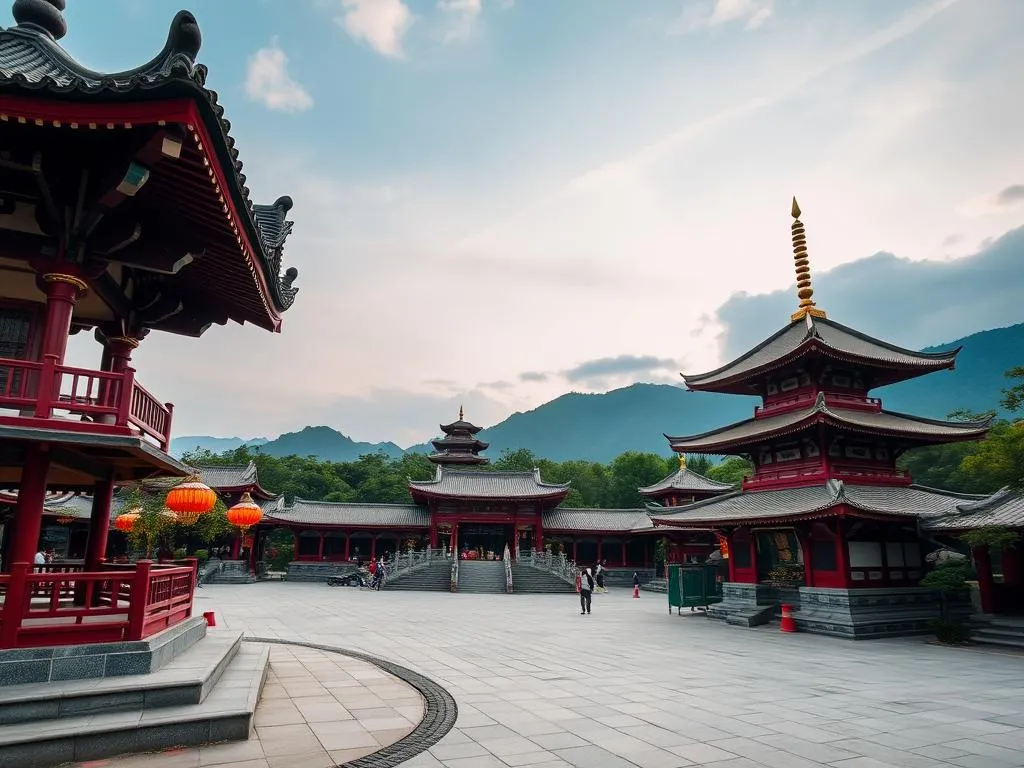Introduction
The pagoda, a towering architectural marvel found across Asia, holds a profound spiritual significance that transcends its physical form. Pagoda spiritual meaning is deeply rooted in the rich tapestry of Eastern spirituality, offering a glimpse into the intricate beliefs and traditions that have shaped the lives of millions. As we delve into the pagoda spiritual meaning, we uncover a world of symbolism, enlightenment, and the pursuit of inner peace.
In the heart of bustling cities and serene landscapes, these iconic structures stand as beacons of spiritual enlightenment, inviting us to explore the deeper layers of our own existence. Join us as we embark on a journey to unravel the pagoda spiritual meaning and unlock the secrets of Eastern spirituality.
Key Takeaways
- The pagoda spiritual meaning is deeply connected to the principles of Buddhism and its quest for enlightenment.
- The architectural design of pagodas is imbued with symbolic elements that represent the path to inner peace and spiritual growth.
- Visiting and meditating within the tranquil confines of a pagoda can foster a sense of connection to the divine and the universal energy that permeates all of existence.
- Embracing the pagoda spiritual meaning can inspire personal transformation, cultivating a deeper understanding of oneself and one’s place in the grand tapestry of the universe.
The Spiritual Significance of Pagodas in Buddhism
At the heart of the pagoda spiritual meaning lies the profound influence of Buddhism, a philosophy that has shaped the cultural and spiritual landscape of Asia for centuries. Pagodas, with their distinct multi-tiered design, are often associated with the spread of Buddhist teachings and the quest for enlightenment.
Each element of a pagoda’s architecture carries a symbolic meaning, guiding the devotee on a journey of self-discovery and spiritual growth. The towering structure, reaching skyward, represents the individual’s aspiration to transcend the physical realm and connect with the divine. The multiple levels, or tiers, symbolize the various stages of the Buddhist path, from the material world to the realm of enlightenment.
As you ascend the pagoda, you’re encouraged to shed the burdens of the earthly plane and focus your mind on the pursuit of inner peace. The act of climbing the pagoda’s stairs can be seen as a metaphor for the gradual process of self-reflection and the shedding of attachments, ultimately leading to a deeper understanding of the true nature of existence.
The Symbolism of Pagoda Architecture
The intricate design of pagodas is not merely a matter of aesthetics; it is a carefully crafted expression of spiritual beliefs and principles. From the foundation to the pinnacle, every aspect of a pagoda’s architecture holds a profound pagoda spiritual meaning.
The base of the pagoda, often square or octagonal in shape, represents the physical world and the material plane. As you ascend, the structure transitions to a circular or more organic shape, symbolizing the journey from the earthly realm to the realm of the divine.
The multiple tiers, or roofs, of the pagoda are said to represent the various levels of the Buddhist cosmos, with each level corresponding to a different stage of spiritual enlightenment. The number of tiers can vary, but the most common configuration is an odd number, such as three, five, or seven, which is believed to hold special significance in Eastern spiritual traditions.
The pointed roof of the pagoda, often adorned with intricate decorations, is thought to symbolize the connection between the earthly and the celestial realms. This spire-like structure is said to channel the universal energy, or “chi,” guiding it from the heavens to the earth and back again.
The Role of Pagodas in Spiritual Practices
Pagodas are not merely architectural marvels; they serve as sacred spaces where devotees can engage in spiritual practices and connect with the divine. Visiting a pagoda can be a transformative experience, as the very act of entering these hallowed halls can evoke a sense of reverence and inner calm.
Within the serene confines of a pagoda, one can engage in various spiritual practices, such as meditation, chanting, or simply contemplating the deeper meaning of existence. The tranquil atmosphere and the powerful energy that permeates these spaces can facilitate a profound sense of connection to the universal consciousness, allowing individuals to transcend the limitations of the physical world and access a deeper understanding of their own spiritual nature.
Some pagodas also house sacred relics or artifacts, such as the ashes of the Buddha or other revered spiritual figures. The presence of these relics is believed to imbue the pagoda with an even greater spiritual significance, attracting devotees from near and far who seek to connect with the divine through these tangible symbols of enlightenment.
The Transformative Power of Pagoda Spiritual Meaning
Embracing the pagoda spiritual meaning can have a profound impact on one’s personal growth and spiritual journey. By engaging with the rich symbolism and energy of these iconic structures, individuals can unlock the doorway to a deeper understanding of themselves and their place in the grand tapestry of the universe.
Visiting a pagoda can be a transformative experience, as the act of physically ascending the structure can mirror the internal process of self-reflection and the shedding of attachments. As you climb the stairs, you’re encouraged to let go of the burdens of the material world and focus your mind on the pursuit of enlightenment.
The pagoda spiritual meaning can also inspire personal transformation through the practice of meditation and contemplation. By immersing oneself in the serene atmosphere of a pagoda, individuals can cultivate a heightened sense of awareness, allowing them to access deeper levels of consciousness and connect with the universal energy that flows through all of existence.
Moreover, the pagoda spiritual meaning can serve as a powerful source of inspiration, guiding individuals on a journey of self-discovery and personal growth. By embracing the principles and symbolism embodied by these iconic structures, one can develop a greater appreciation for the interconnectedness of all things, fostering a sense of harmony and purpose in their lives.
Conclusion
The pagoda spiritual meaning is a profound and multifaceted concept that transcends the physical realm, offering a gateway to the deeper layers of Eastern spirituality. These towering structures, with their intricate design and rich symbolism, serve as beacons of enlightenment, inviting us to embark on a transformative journey of self-discovery and the pursuit of inner peace.
As we delve into the pagoda spiritual meaning, we uncover a world of wisdom and insight that can profoundly shape our understanding of ourselves and our place in the grand tapestry of the universe. By embracing the principles and practices associated with these iconic structures, we can cultivate a deeper sense of connection to the divine, unlock the secrets of our own spiritual nature, and ultimately, embark on a path of personal growth and transformation.
So, the next time you find yourself in the presence of a majestic pagoda, take a moment to pause, reflect, and allow its pagoda spiritual meaning to guide you on a journey of self-discovery and the pursuit of enlightenment.








